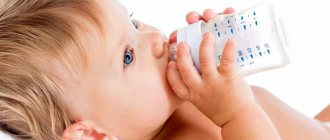Spitting up milk is a natural process for a baby. His stomach is still too small, and the sphincter that holds food is undeveloped. Therefore, after feeding, food can sometimes leak out. This mainly happens when the newborn is immediately placed on his back or they begin to play with him too actively. Ordinary belching can also provoke regurgitation. Air bubbles push some of the food out, and then it flows out of the mouth in small quantities.
It's a completely different matter if a newborn burps through the nose and mouth. Vomiting like a fountain may indicate health problems. What pathologies are we talking about, and what should parents do? We'll tell you further.
Regurgitation in a newborn and infant
Just so you understand, regurgitation is not observed in all small children . But still, most children have it. If you believe the statistics, then in the first weeks of life, 8 out of 10 babies still spit up.
Already in the second trimester of life, regurgitation occurs less frequently, and by the end of the first year of life it disappears altogether.
Doctors believe that in most cases, babies who were born prematurely or children who were diagnosed with intrauterine growth retardation suffer from this.
This group also includes children who are overweight or, conversely, underweight. Despite this, completely healthy babies burp very often.
There are cases when, at the birth of the first baby, the mother did not encounter such a problem, but with the appearance of the second baby, the mother is in a panic because his regurgitation is very frequent and strong.
Therefore, even experienced parents sometimes do not know what to do about it, how to deal with it, and what is the reason for this condition of the baby.
Every second infant, after feeding, spits up and this is a normal phenomenon associated with the physiology of a little person. Everything happens due to the unimproved structure, as well as the work of the gastrointestinal tract and brain centers.
Let's figure out why newborns regurgitate after feeding?
Reasons for this:
- A child who has just been born does not yet develop the lower esophageal sphincter quite correctly - this is a ring of muscles that should contract after the baby eats. It also keeps food in the stomach. As soon as the mother puts the child down, immediately after eating, everything that he has eaten comes back out.
- Small children still have a very short esophagus.
- Newborns lie in a horizontal position a lot. As mentioned above, everything that is in the ventricle flows out, according to the principle of a lying vessel.
- The ventricle of a newborn baby is very small and has the shape of a ball - this also affects the retention of food in it.
- The centers of the brain that are responsible for eating are not fully developed, so the baby eats much more than he needs. After overeating, he begins to burp.
- Food moves very slowly through the esophagus and often returns back.
- Another reason is swallowing air while eating . Air bubbles begin to rise upward and take part of the consumed substance with them.
All of the above causes regurgitation in small children. As soon as organs and systems begin to develop more, the problem gradually disappears. Spitting is a feature only of small children.
Regurgitation in infants
Often, babies burp when they eat or immediately after eating. It happens that this happens some time after eating. From this we can conclude that it is connected only with the fact that the child was fed.
And if we take into account the reasons that were mentioned earlier, then it will be clear to everyone how and why this happens.
If a child’s regurgitation is repeated for physiological reasons, and there is no hint of pathology in his body, then the child cannot experience any inconvenience.
After burping, he laughs because there is no discomfort, and sometimes after this he even feels better - the air that he swallowed during feeding or excess food comes out.
After all, if there is too much of it, the child feels pressure in the ventricle and this does not make him feel very good.
But there are cases when the baby eats, burps and begins to cry a lot, squirm and even scream. This is already a serious problem with which it is necessary to immediately seek help from doctors.
This behavior of the baby may indicate disorders in his body, namely, irritation of the esophagus with gastric juice may occur.
Regurgitation in the form of cottage cheese in small children
As mentioned above, regurgitation is the getting rid of part of the food that was in the baby’s esophagus or stomach. It may already be overcooked, and sometimes curdled.
If the baby burps immediately after feeding, then liquid food comes out, and after a while there will be curdled emissions. Sometimes babies can spit up like this, but not often. If you observe this constantly between feedings, then you need to consult a pediatrician or surgeon.
They may not find any disorders or pathologies in the child, but it’s still better to be safe than to think later why they didn’t contact you on time.
Excessive regurgitation in newborns
Often young mothers complain that their babies spit up very much and it looks like a fountain.
If we consider this issue, we first need to clarify that a child can have not only regurgitation, but also vomiting - they differ significantly from each other. They have different manifestations and causes, so the actions of parents regarding their occurrence should also be different.
The baby usually burps immediately after eating and not often, in small quantities. There are times when a baby will burp a lot.
As for vomiting, it can appear at any time and does not depend on food intake. While regurgitation occurs from time to time, vomiting is repeated over and over again. When vomiting, the baby will be restless.
Young parents need to know that if the baby spits up everything he eats, you can’t feed him again right away. This must be done at his own request. The digestive system needs to be given a rest from time to time so that it can work properly.
Sometimes, due to a spasm of the pylorus, a child can throw out food very sharply and in a fountain over a long distance. If these are isolated cases, then this may happen. But, when you notice this in your baby often, it is better to visit a pediatrician.
Yellow regurgitation in babies
If we talk about vomiting, then it is always profuse, so mothers say that the child spits up a lot. Unlike regurgitation, it may have a yellow color and gives off a sour, pungent odor.
Why is that? There is only one reason - with the food that comes out of the stomach, gastric juice and sometimes bile are released. If you see that your baby is burping and a yellow color appears, you urgently need to contact a specialist, or, to be more precise, a gastroenterologist and surgeon.
It is very important for parents to know: if your baby is spitting up green or brown, he may have an intestinal obstruction. In this case, a visit to the hospital is mandatory.
What to do when a newborn baby spits up through the nose and mouth
A child can burp for one reason or for several at once. Up to six months, regurgitation in children is considered normal, and it is due to the peculiar structure of the gastrointestinal tract. The causes of regurgitation in infants under six months are called physiological. These include:
- short esophagus;
- insufficiently expressed narrowing of the esophagus;
- the muscular sphincter (the part of the body that regulates the passage of food from one organ to another) is not sufficiently developed;
- an insufficiently formed system for moving food through the gastrointestinal tract.
When a baby spits up after each breastfeeding, this is also the norm, starting from two months of age and up to one year.
☝ From four months, a child should burp no more than once a day. There are a number of reasons that are caused by errors in child care. In these cases, you need to quickly correct the mistakes and then the regurgitation will stop. Such reasons include:
- Swallowing air with food. Occurs when the baby sucks incorrectly: does not fully wrap his lips around the nipple or breast, eats in the wrong position, has a bad nipple, or has an insufficiently screwed bottle cap. To avoid these reasons, you need to ensure that the baby completely clasps the mother's nipple, so that his bottle is always tightly closed, and there is nothing in it except the mixture.
- Binge eating. Another common reason. Feeding the baby on demand rather than on a schedule can lead to this. Such experiments should be stopped immediately.
- Colic and gas formation. Gas bubbles press on the walls of the stomach and intestines, causing food rejection.
- Breast milk intolerance. A rare cause caused by poor nutrition of the mother. In this case, you need to go to the doctor, they will prescribe a suitable mixture.
- Excessive activity. Do not touch the child immediately after he has eaten.
Physiological regurgitation after feeding
Sphincter weakness
By 4 months, regurgitation should decrease and even stop altogether.
From 1 to 3 months of life in children, the formation of the gastrointestinal tract ends. The esophagus takes on a regular curved shape, although initially it is completely straight and short.
The sphincter connecting it to the stomach is also often poorly developed. Such factors contribute to the rapid release of milk along with air.
Milk seems to “pouring out” from the baby’s mouth in small quantities, usually some time after eating.
There is no need to do anything special in such a situation. It is not difficult to avoid regurgitation if, immediately after feeding, you hold the baby in an upright position and allow the air accumulated in the stomach to escape. By 4 months, the problem usually stops bothering the baby, otherwise you should consult a doctor. Until this age, attacks can be repeated constantly, each time after feeding.
Types of regurgitation
There are several of them. All of them are caused by different reasons, some indicate the danger of diseases, and some are natural for the baby’s body. It is better to learn more about each of them, because an infant can change from one type to another. Such a transition can be caused by both natural and dangerous changes in the functioning of the gastrointestinal tract.
Regurgitation "fountain"
This type of regurgitation is very dangerous. If a mother notices this in her baby, she should immediately consult a doctor. It is believed that the baby may suffer, even death (he may simply choke).
By the way, Komarovsky denies the danger of even these types of regurgitation, arguing that a child can choke only if he lies on his back. One way or another, only a specialist can help in such cases.
Causes of fountain regurgitation include:
- serious problems with the gastrointestinal tract;
- birth injuries;
- poisoning or infection.
- dysphagia (digestive disorders).
Spitting up like a fountain is dangerous for your baby
Burping through the nose
It also happens that a newborn burps through the nose. This is also not the norm. This type of regurgitation leads to the development of polyps. The integrity of the nasal mucous membranes is compromised. In order to help a newborn, you need to consult a doctor.
☝ The reason for regurgitation through the nose often lies in improper feeding. It is necessary to ensure that the child eats in the correct position and exactly on time, and clasps the pacifier correctly. In order to help the baby, you can put him on your stomach, or give him a special massage. This will help your child stop hiccupping.
How to reduce burping in a child after eating
The simplest thing you can do is just wait. A newborn should stop burping by the age of six months. There is no way to stop this process artificially - there are no universal cures for regurgitation.
All a mother can do for her child is to try to reduce this process and make it painless.
To achieve this, there are a number of specific measures, especially those that should be taken into account by mothers whose children behave restlessly both day and night.
- You don't need to feed your baby too much. Meals should be balanced and consistent with the schedule.
- It is not recommended to feed the baby in a horizontal position. The ideal position would be at an angle of sixty degrees.
- You need to make sure that the baby completely clasps the nipple. With IV, it is important to monitor the quality of the mixture and the correct filling of the bottle.
- While eating, it is necessary to monitor the baby's posture; its head should be located above the body.
- Before feeding, you can give your baby a light abdominal massage. You can let your baby lie on his stomach for a while, this will reduce gas and colic.
- After feeding, the baby is carried in his arms in an upright position until he burps.
- You can place several diapers under the baby's head while sleeping, thereby elevating his head and making burping easier.
- The milk mixture should be warm. You need to feed your baby at the same time. You need to make sure that the mixture does not curdle and do not heat it for too long.
- You should not feed a crying baby. You should refrain from activity after eating.
- You can give your baby a pacifier before bed; this will ease colic a little by stimulating bowel function.
Correct position during feeding
Wrong actions of parents
It is necessary to ensure that nutrition is carried out according to the norm. When vomiting or regurgitating, do not cover your baby's nose. There is no need to actively play, change clothes or rock him to sleep. Incorrect actions also include abruptly turning over or changing position. It is recommended to lift it smoothly, supporting your head.
In order to avoid negative changes, it is recommended to adhere to the feeding regime. There is no need to exceed the food allowance. The release of milk or formula is caused by frequent active interaction with the baby: playing or rocking. It is better to take calm actions. There is also no need to ignore the problem. If in any doubt, consult your doctor for detailed advice.
Massage before feeding
A light massage should always be done before meals. This takes about five minutes.
First, the belly is stroked with light soothing movements, while during the massage you should not touch the area of the right hypochondrium, where the baby’s liver is located. Then make light pressing movements with your hands from right to left.
The following movements are made from top to bottom along the central part of the abdomen. Then one hand is left on the stomach, and the second is stroked, first on the left, then on the right side.
Now stroke with one hand down and the other at the same time up. Then the baby's tummy is stroked in a circle. First with one hand, then with both hands. You can massage the baby with “P” shaped movements. First from left from bottom to top, then with a corner from left to right, then from top to bottom, and so on.
The massage itself should be done in a clockwise direction. You need to spend about 1.5 minutes on each movement.
Massage before feeding - lie on your tummy
What to do
Remember that there are no safe medications to reduce regurgitation! Before using medications, be sure to consult your doctor!
Source: https://ryabinka5.ru/zdorove/u-novorozhdennogo-moloko-vytekaet-cherez-nos.html
If your baby spits up a lot through his nose
In the case when you very often see that your child spits up and this happens in large quantities, you cannot postpone visiting a doctor.
Although, if the baby behaves calmly, nothing bothers him, he is gaining weight well according to all standards, then this may be normal for your baby and not dangerous to his health.
Sometimes, a child spits up so much that food comes out not only through the mouth, but also through the nose. Moms, when they see this, begin to panic, but you need to understand that when this happens rarely, the baby behaves calmly, then there is no need to be scared.
This happens in completely healthy children.
In such cases, it is very important to stay near the baby so that he does not choke, you need to turn him or lift him. To ensure that the nose can breathe normally, doctors advise using a nasal aspirator.
A mother should not be afraid when the baby starts crying due to temporary holding of breath through a clogged nose. This is fine. The baby just needs to be calmed down with light stroking.
Normal regurgitation in babies
Many mothers and fathers are interested in the question: Does regurgitation occur in infants until what age? What's the norm? Each specialist, in his own way, determines the norm of regurgitation in young children, so that parents have something to focus on if their baby has such a problem.
Nowadays, there is already a table in which these norms are spelled out. According to experts, it should make up a fifth of the food consumed and will be repeated no more than 5 times a day.
In reality, it is very difficult to use such norms. After all, you simply cannot measure how many grams your baby burped. In addition, it is also necessary to monitor how much the baby eats, how he behaves and feels.
It is best to focus on the following standards: if the child has eaten and behaves calmly and cheerfully after spitting up, then there is no reason to worry. What do you mean by the expression burped a little?
This is no more than 10 ml. If you want to see how much it is, you will need two tablespoons of milk, which must be poured onto the diaper. When your baby spits more, consult your pediatrician at the hospital.
It should be noted that the main thing in this situation will be the child’s correct weight gain. If the baby eats well, burps, does not cry, behaves calmly and gains weight well, then there is nothing to worry about.
Regurgitation as a natural process
Most often, the reason for regurgitation is physiological. In this case, apart from the release of a small amount of milk, nothing bothers the baby. The baby remains calm, does not cry or be capricious. Sometimes after regurgitation, he even begins to smile, because he feels relieved.
If we talk about standards, the amount of liquid should not exceed 10 ml. This is about two tablespoons. The permissible frequency of regurgitation is up to 5 times a day, mainly after feeding. In this case, the vomit should not have a strong odor. The consistency can be liquid or curdled. The more time passes after feeding, the denser the secretion will be. The normal color of vomit is transparent white.
Why do newborn babies spit up? This phenomenon is primarily associated with the immaturity of the children's digestive system, as well as the location of the stomach. The main reasons usually include the following:
- physiological weakness of the esophageal sphincter;
- small volume and high location of the stomach;
- swallowing air during feeding;
- insufficient coordination of sucking, swallowing and breathing (lasts up to 2 months);
- enzyme immaturity;
- binge eating.
According to statistics, 67% of infants up to a certain age spit up breast milk, while physically they are completely healthy.
Sometimes milk may come out through the nose, for example, when the baby is lying down. In this case, it is important to ensure that the newborn does not choke. You need to turn him tummy down and lightly pat him on the back. Next, the nasal passage must be cleaned with an aspirator.
Causes of regurgitation in newborns
We have already discussed the physiological causes of regurgitation in the article above.
To be brief, this is:
- the child swallows air while swallowing, overeats;
- weak ventricular muscles;
- immaturity of enzymes;
- features of the stomach of a small child;
- individual food intolerance.
Sometimes, regurgitation can appear when babies are teething. Another important reason for regurgitation in infants is an insufficient amount of enzymes in the ventricle, which take part in the digestion of food.
With normal child development, such enzymes begin to be produced already in the third week of life. But there are cases when they are not enough and this is already a pathology that needs to be eliminated.
In addition to these reasons, many children are concerned about disturbances in the functioning of the gastrointestinal tract and nervous system.
Because of this, regurgitation occurs in newborns.
Komarovsky identifies the following pathological causes:
- Congenital anomaly of the gastrointestinal tract.
- Malformation of the diaphragm or gastrointestinal tract.
- Increased activity of the nervous system.
- Infections or poisoning.
- Violation of metabolic processes, which can be inherited.
If your child has this, then you will need the help of a specialist.
What to do when a baby spits up?
If your baby has a pathological cause for regurgitation, then you must follow the doctors' recommendations . In most cases, this is treated with drugs, but sometimes surgery is required.
Practice shows that very rarely regurgitation occurs due to pathologies. In most cases, relatives panic in vain, believing that the baby spits up often and a lot, but in fact, the child is healthy.
Many mothers claim that despite the fact that they were afraid for the condition of their child, the doctors frightened them with terrible diagnoses, and they themselves made a lot of efforts to overcome the problem - in infants it went away on its own when the child began to spend more time in an upright position rather than horizontal.
This occurs during the period when the baby began to walk or sit on his own. Positive changes also appeared after the child began to eat thicker foods.
Doctors say that the problem of regurgitation in children goes away from six months to a year. Experienced pediatricians say that such a problem can sometimes take up to a year and a half to manifest itself - this applies to premature babies.
Despite all the recommendations, you cannot wait until the baby grows up. In many cases, babies spit up precisely because they are overfed. Try feeding your baby less. If he has eaten a lot, he will spit up immediately after feeding and it will not be curd milk, but regular milk.
If your baby spends a lot of time sucking on one breast, you should not give him the other. Let him feed until the end with one, and give the second after he gets a little hungry. How is this useful?
The baby will be able to eat hind milk, which is the healthiest and cannot cause gastrointestinal disorders. It happens that the baby is full, but he just wants to suckle, then such techniques contribute to overeating.
When a child is on artificial or mixed feeding, you need to try to give him a little less food or take longer breaks between feedings. At the same time, be sure to watch what reaction the baby will have.
To know exactly how much formula is needed for your baby, use the formula:
1 + child’s age in months (5) + 0 = 150 milliliters.
Sometimes it is better to feed in small portions, but more often, while sticking to the amount of food that the child needs per day, based on his age.
It is also important to prevent air from entering during feeding. To do this, you need to learn how to properly attach your baby to the breast. The baby should grab not only the nipple, but also the areola around it.
You should not put your baby to your breast when he is crying. After all, then he will definitely swallow air. It is necessary to stop feeding a few seconds after the start, because this is when the baby eats very greedily and a lot of air gets inside.
When you stop feeding for a few seconds and lift your baby to an upright position, those bubbles that have sunk deep will come out. When the baby has burped, you can continue the feeding process. If necessary, you can repeat the break again.
Using this tactic you can avoid overeating. Everyone knows that the brain receives a signal of saturation a little later than a person is full. When you take a break, your baby will be able to understand much faster that he doesn’t want to eat anymore.
When your baby is bottle-fed, you need to choose the right nipple for her. The hole in it should correspond to the age of the baby. It is important how you hold the bottle when feeding. Its position should be such that the entire nipple is filled with the mixture. This is necessary to ensure that air does not enter the child’s ventricle. Nowadays, mothers choose special anti-colic bottles.
An equally important point when dealing with regurgitation is choosing the right mixture that would suit your baby and his gastrointestinal tract reacts to it correctly. If you change the formula and your baby starts spitting up after that, it is better not to use it and replace it with another one.
You should always consult your pediatrician. It happens that a child needs a special mixture against regurgitation. Its markings contain the letters AR. This mixture has a thicker consistency.
Therefore, it stays better in the ventricle. You can also thicken your mixture using starches from rice, corn or potatoes. In this case, it is necessary to adhere to the proportions - 1 tbsp. a spoonful of starch per 60 milliliters of already diluted mixture or mother’s milk.
In order for the child to get rid of swallowed air, you need to carry him in an upright position. This is done after each meal for several minutes.
The mother herself must watch how much time her child needs until the burp goes away. Before giving your baby something to eat, it is important to lay it on his stomach; it would be good if you give your baby a belly massage. To do this, you need to stroke it lightly, always clockwise.
It is also necessary to take into account the fact that it is difficult for a small child to breathe only through his nose, so air, one way or another, will enter through the mouth even during feeding. To make it easier for the baby, a normal microclimate in the room where he is is very important.
The air temperature should not exceed 22 degrees, and humidity – 50-70%. The mother should monitor the baby’s nose and remove the crusts that have formed in it from time to time.
There are times when, as soon as the mother puts the baby in the crib, he immediately begins to spit up.
To prevent this from happening, you need to raise the place where the head lies. To do this, you can place something under the legs of the bed. Some parents say that if they do not touch the baby after feeding, he does not spit up.
If the baby is not carried but left lying down, it is important to ensure that the head is turned to the side. This safety measure is necessary so that the baby does not suffocate when he burps air.
Do not squeeze the baby's tummy. To avoid this, you need to fasten the diaper more easily, swaddle more loosely, and do not wear pants with an elastic band. After eating food, leave the baby alone.
When feeding, make sure that the head is higher than the tummy and legs. Make sure your baby has bowel movements regularly.
Possible pathologies
If a child burps profusely and frequently through the nose and mouth, this may indicate congenital diseases of the nervous or digestive system. Among the pathological causes, doctors identify the following:
- perinatal encephalopathy;
- hydrocephalus;
- anomalies of the gastrointestinal tract (diaphragmatic hernia, pyloric stenosis);
- infectious diseases (poisoning, sepsis, hepatitis, meningitis);
- hereditary metabolic disorders (isolated cases).
Also, newborns often regurgitate due to birth trauma, when the blood circulation in the brain is impaired. This problem often occurs in premature babies. In these cases, regurgitation is usually preceded by belching.
When should you see a doctor?
It is imperative to visit the hospital if:
- The baby spits up everything he has eaten.
- The baby started burping after 6 months.
- The baby does not gain weight and spits up.
- The baby is restless and crying.
- The baby burps profusely after every meal.
- Along with regurgitation, the temperature rises.
Every family worries about the health of their baby. But, if the child behaves cheerfully and calmly, gains weight well, the doctors have not found any abnormalities in him - there is no need to take any medications because your child is spitting up.
Everything will work out as soon as the baby starts to grow up.
A newborn baby burps through the nose and mouth after feeding: causes of regurgitation
Regurgitation in infants is a very common event. However, when a newborn burps through the nose, it becomes a cause for concern for mothers. Almost always, parents want to know whether it is dangerous and how to reduce the amount of burp.
Baby burped
Spitting up in babies is normal.
Regurgitation, or regurgitation, is one of the typical phenomena that accompany the process of feeding an infant. This is the release of food (milk) along with saliva from the baby’s mouth, which occurs during feeding or immediately after it, for about half an hour. Sometimes a newborn's milk comes out through the mouth and nose.
Regurgitation appears after the first portions of milk and can last up to almost 12 months, maximum up to one and a half years.
Important! Most babies burp a couple of times a day; the frequency of belching may be more or less in different children.
Main characteristics of normal regurgitation:
- The baby is gaining weight well;
- Belching does not cause discomfort. The baby does not cough, does not lose appetite, does not cry.
Belching should be distinguished from vomiting. The latter is caused by the retrograde movement of the digestive tract, displacing its contents backwards, this is an active mechanism. When a baby vomits, it is noticeable that he makes efforts, expressed in spasms. When regurgitating, the contents of the stomach return without effort on the part of the baby. This is a passive mechanism.
Causes of regurgitation
Why does a newborn baby spit up in his sleep?
Essentially, there are only three reasons for physiological regurgitation:
- Immaturity of the cardia. The cardia is the outlet from the esophagus into the stomach, a kind of valve whose purpose is to prevent the contents of the stomach from entering the esophagus. It takes some time for the cardia to begin to function fully, and for the digestive system to reach maturity, ensuring the balanced functioning of all its elements;
- Type of food. Babies have liquid food, which contributes to the problem. As soon as complementary feeding begins and the baby gradually eats more and more solid food, he will burp less and less often;
- Baby's position. The baby spends most of its day in a horizontal position, which is not ideal for preventing burping.
If a baby sucks very quickly, especially often when using a bottle with formula, the likelihood of regurgitation increases, including the possibility of regurgitation through the nose in infants.
Baby sucking a bottle
The reason for frequent regurgitation is an allergy to the ingredients of the formula during artificial feeding or components contained in breast milk (if the mother consumed them). Cow's milk protein is the most common cause of food intolerance in infants. When babies start teething, they may also spit up more often.
Is there any danger in burping through the nose?
Why does a newborn baby spit up everything he eats?
If a child burps through the nose, parents should not worry, because the mouth and nose are anatomically connected. In principle, this is harmless and does not happen very often.
Important! Physiological regurgitation through the nose in newborns can become dangerous only if the discharge is not cleaned up in time. Then the baby will begin to sniffle with his nose, at a certain moment he will be able to inhale sharply, and the burp will end up in the respiratory passages.
If there is bile or stomach acid in the stomach contents, it will irritate the nasal passages. Damage to the nasal mucosa can subsequently affect the formation of polyps or adenoids. However, with physiological regurgitation, the presence of bile is not normal, but may be a symptom of pathology.
If the reasons why milk comes out of a newborn’s nose are natural, and this phenomenon cannot be completely eliminated, then the amount and frequency of belching can be reduced.
How to reduce spitting up
Why does a newborn baby spit up mucus?
Methods that can reduce regurgitation:
- You don't have to wait until your baby is very hungry to feed him. If your baby begins to cry from hunger, he will eat greedily and swallow more air, which can lead to much more frequent and copious burps;
- During feeding, you can take breaks from time to time so that the baby can burp air as needed;
Important! If the mother, while feeding, sees that the newborn has burped through the nose and mouth, it is necessary to take a break before continuing to feed the baby.
- Raise the baby upright after feeding and hold it for about half an hour. If regurgitation is inevitable, then let it happen in an upright position. Then you should put the baby on his side. This position is not dangerous, the baby will not choke even when he burps;
Lifting baby upright
- Children should not be overfed. If your stomach is full, the likelihood of belching increases dramatically. Moreover, it will most likely be abundant;
- For bottle-fed or mixed-fed infants, the hole in the nipple should be neither too large nor small. In both cases, the baby will swallow more air;
- When breastfeeding, special attention should be paid to the baby's correct latch on the nipple. The child should tightly wrap his lips around the nipple itself and the area around it;
- Avoid giving a bottle to a baby lying on his back. It is best to feed him by holding him in your arms and raising his head. The bottle must be held at an angle and ensure that the entire nipple is filled with milk;
Correct baby position when feeding
- It is necessary to create a calm, calm atmosphere during feeding so that the baby does not become too excited. The likelihood of excessive belching will decrease;
- Immediately after eating, you should not engage in physical exercises, massage, or force the baby to make sudden movements.
For children with physiological reflux, you should not use cereals to thicken milk (for example, oatmeal), or use special anti-reflux formulas containing thickeners.
Important! For a child in the first months of life, grains can put unnecessary strain on the digestive system, and anti-reflux formulas are not indicated for all babies. They can be given after preliminary consultation with a specialist.
Antireflux mixtures
There are three types of reflux in children:
- Physiological, in this case there is no concern for the baby’s health;
- Chronic, when the child’s growth slows down and he gains weight poorly. In this case, the doctor should advise how to solve the problem;
- Symptomatic if regurgitation occurs very often, even when the baby gains weight and grows normally.
In 95% of cases, regurgitation is physiological and goes away during the first year of life. It stops gradually as the cardia gets used to regular work and the digestive system reaches a certain degree of maturity.
After 6 months, introducing solid foods into your baby's diet will help stop regurgitation, which worsens when drinking large amounts of liquid.
Regurgitated masses that come out at long intervals after feeding may contain not only milk and saliva, but also gastric juice. The latter irritates the esophagus.
An additional benefit of solid food is that, once in the stomach, it can absorb these caustic liquids.









